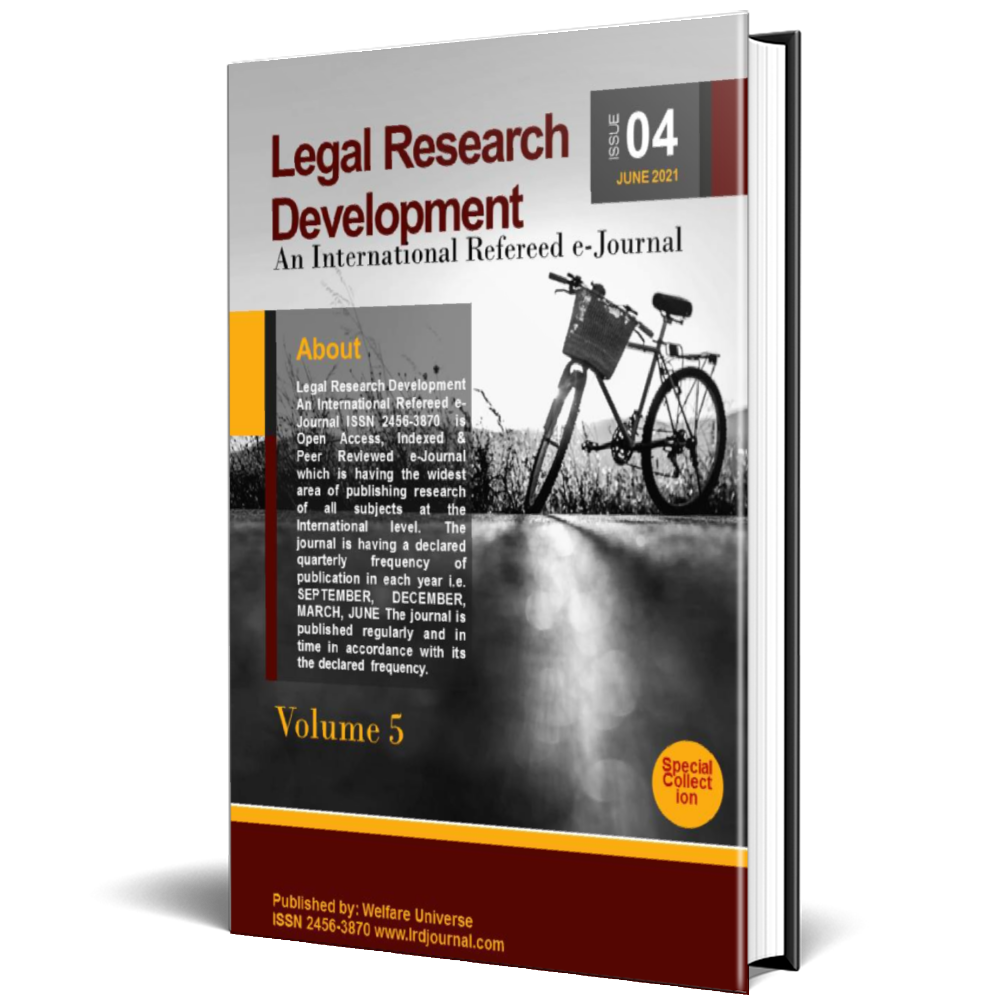Interplay between Law and Morality and its Role in Restoring Dignity to the Sexual and Gender Minorities in India
DOI:
https://doi.org/10.53724/lrd/v9n2.5Keywords:
Hart-Devlin Debate on Law and Morality, Homosexuality, Fundamental Rights, Sec 377 of Indian Penal Code, Bhartiya Nyaya Sanhita, 2023Abstract
Law has always been an instrument for bringing about changes in society. It regulates and controls the behaviour of individuals. More often than not, the prevalent morality of any given society is reflected in the body of laws that govern it. The laws are based on the collective conscience and moral values. Similarly, the morals and ethical mores that prevail in a society at any given time is deeply entrenched in its religious ethos and have always shaped behaviour and decisions of the country’s populace, and this ultimately determines as to what is acceptable or unacceptable in society. One realises that the realms of law, morality and religion are ever intersecting and overlapping each other and at the same time are constantly changing also. The body of laws that exists in society raises and maintain the moral compass of a society. The question which, therefore, arises is whether role of law, as a tool to effect change in society, is restricted to just that, i.e., to enforce public morals? The article deals with the interplay of Law and Morality, delving into the debate of Hart-Devlin on Law and Morality in the light of the concept of homosexuality and the accessibility of basic rights and dignity to the LGBTQ community in India. The article has also dealt with the changing judicial trend as is seen from interpretations given by judiciary, of Section 377 of erstwhile IPC, in their pronouncements that indicate a shift from “persecution” to “protection” of sexual minorities.
References
WRIT PETITION (CRIMINAL) NO. 76 OF 2016.
Ibid
Paul Tillich, Morality and Beyond, 22 (1963), As quoted by Lon N Fuller in The Morality of Law at 6
R.M. Dworkin, ed., The Philosophy of Law at p 79(Oxford University Press, New York, 1977)
Report of the Committee on Homosexual Offences and Prostitution, 1957, CMD 247. (October, 1957)
Home Office, Scottish Home Department, Report of the Committee on Homosexual Offences and Prostitution, 1957, CMD 247. (October, 1957)
Patrick Baron Devlin, The Enforcement of Law, (Oxford University Press, London, New York, 1968)
Ketki Jaltare, “Law and Morals! Mills, Hart-Devlin Debate,” Available at: http://www.vidhikarya.com/legal-blog/LAW-AND-MORALS-MILLS-HART-DEVLINDEBATE (Last Visited on September 18, 2024)
J.S. Neill, “A Short Guide to Hart-Devlin Debate,” Available at: <https://youtu.be/6X7yFQlWrC8> (Last Visited on October 7, 2024).
Dawid Bunikowski, “Legal Protection of the Value of Morality: The Hart-Devlin Debate,” (January 31, 2015). Available at: https://ssrn.com/abstract=27255388 >, (Last Visited on October 7, 2024).
Ravindra Kumar Singh, “Hart’s Concept of Law and Justice”, Available at < https://www.bhu.ac.in > (Last Visited on September 20, 2024)
Ravindra Kumar Singh, “Hart’s Concept of Law and Justice”, Available at < https://www.bhu.ac.in > (Last Visited on November 1, 2024)
Naz Foundation v. Government of NCT of Delhi and Others WP(C) No.7455/2001
Suresh Kumar Koushal v. Naz Foundation and Ors. Civil Appeal No. 10972 of 2013
K..I. Vibhute “Consensual Homosexuality and the Indian Penal Code: Some reflections on the Interplay On Law and Morality,” 51 (1) Journal of Indian Law Institute, 3-31 (2009). DOI: https://www.jstor.org/stable/43953422
Law Commission of India, 42nd Report on The Indian Penal Code, 1860 (June, 1971).
Law Commission of India, 156th Report on The Indian Penal Code, 1860 (August, 1997).
Suresh Kumar Koushal v. Naz Foundation and Ors. Civil Appeal No. 10972 of 2013
K..I. Vibhute “Consensual Homosexuality and the Indian Penal Code: Some reflections on the Interplay On Law and Morality,” 51 (1) Journal of Indian Law Institute, 3-31 (2009). DOI: https://www.jstor.org/stable/43953422
Chelsea Peer, “Homosexuality and Gender Expression in India,” 1(1) The Alpha Chi Journal of Undergraduate Scholarship, (2016). DOI: 10.21081/ax0021
Saleem Kidwai and Ruth Vanita (eds.), Same Sex Love in India: Readings from Literature and History (St Martin Press Palgrave Macmillan, 2001)
Id
Section 377, Indian Penal Code, Act No. 25 of 1860
Indian Penal Code, Act No.25 0f 1860
Government v. Bapoji Bhatt, (1884) 7 Mysore LR 280.
In Re Govindrajulu 1886 1 Weir 382; Khanu v. Emperor AIR 1925 Sind 286.
Khanu v. Emperor, AIR 1934 Lah 261
Brother John Anthony v. State, 1992 Cri.LJ 1352, 1359 (Mad)
Rex v Samuel Jacobs (1817) Russ and Rly 381 CCE (which laid down that penetration of penis through the mouth doesn’t amount to sodomy).
Lohana Vasantlal Devchand & Ors v The State, AIR 1968 Guj 252
1992 I OLR 316
C.J.S., Volume 81, pp 368-370 (Thompson West Publishing Company)
1992 I OLR 316
AIR 1963 SC 323
Ibid AIR 1963 SC 323
Abhishek Pandey, “Strict Scrutiny Test in Constitutional Adjudication”, Available at: <http://www.legalservicesindia.com/article/1511/Strict-Scrutiny-test-in-Constitutional-Adjudication:-Indian-Experience.html> (Last Visited on October 22, 2024)
Abhishek Pandey, “Strict Scrutiny Test in Constitutional adjudication: Indian Experience,” Available At: <https://www.legalservicesindia.com/article/1511/Strict-Scrutiny-Testin-Constitutional-Adjudication:-Indian-Experience.html> (Last Visited on September 17, 2024)
Geetanjali Mishra, “Decriminalising Homosexuality in India,” 17(34) Reproductive Health Matters, 20-28 (2009). DOI: https://doi.org/10.1016/So968-8080(09)34478-X
Law Commission of India, 172nd Report on Review of Rape Laws, 2000 (March, 2000).
Supra at note 1
Newly Paul, “When Love Wins: Framing Analysis of the Indian Media’s Coverage of Section 377, Decriminalization of Same-Sex Relationships,” 43(1), Newspaper Research Journal 7-28 (2022). DOI: https://doi.org/10.1177/07395329221076595
Khanu vs Emperor, AIR 1925 Sind. 286
Lohana Vasantlal v. State, AIR 1968 Guj. 352
Fazal Rab Choudhary v. State of Bihar, AIR 1963 SC 323
1998 8 SCC 296.
Mr. X v. Hospital Z, 1998 8 SCC 296.
Henry F. Fradella, “Legal Moral and Social Reasons for Decriminalising Sodomy,” 18(3) Journal of Contemporary Criminal Justice, 279-301 (2002). DOI: https://doi.org/10.1177/1043986202018003005
Justice K.S. Puttaswamy (Retd.) and Anr. v. Union of India and Ors., AIR 2017 SC 1461
The Constitution of India, 1950.
Suresh Kumar Koushal v. Naz Foundation and Ors. Civil Appeal No. 10972 of 2013
Suresh Kumar Koushal v. Naz Foundation and Ors. Civil Appeal No. 10972 of 2013
Lata Singh vs State of UP and Anr. (2006) 5 SCC 475.
Suresh Kumar Koushal v. Naz Foundation and Ors. Civil Appeal No. 10972 of 2013.
J. Vankatesan, “Supreme, Court Sets Aside the High Court Judgement Decriminalising Gay Sex,” The Hindu, December 11, 2013.
See Dhananjay Mahapatra, “Law Commission had Recommended Section 377’s Deletion 13 Years Ago,” The Times of India, 13 December, 2013, Available at: <http://timesofindia.indiatimes.com/india/Law-Commission-had-recommended-section-377s-deletion-13-yrs-ago/articleshow/27264963.cms> (Last Visited on October 18, 2024).
Downloads
Published
How to Cite
Issue
Section
License
Copyright (c) 2024 Legal Research Development

This work is licensed under a Creative Commons Attribution-NonCommercial 4.0 International License.










